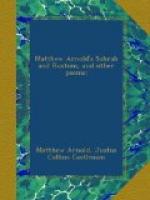The sight of his own signet rendered Rustum quite frantic; he cursed himself, and would have put an end to his existence but for the efforts of his expiring son. After Sohrab’s death he burnt his tents and carried the corpse to his father’s home in Seistan, and buried it there. The Tartar army, agreeable to Sohrab’s last request, was permitted to return home unmolested. When the tidings of Sohrab’s death reached his mother, she was inconsolable, and died in less than a year.
In the main the story as told by Arnold follows the original narrative. A careful investigation of the alterations made, and the effect thus produced, will lend added interest to the study of the poem and give ample theme for composition work.
=1. And the first grey of morning fill’d the east.= Note the abrupt opening. What is gained by its use? At what point in the story as told in the introductory note does the poem take up the narrative? Be sure to get a clear mental picture of the initiative scene. And is here used in a manner common in the Scriptures. Cf. “And the Lord spake unto Moses,” etc.
=2. Oxus.= The chief river of Central Asia, which separated Turan from Iran or the Persian Empire, called Oxus by the Greeks and Romans, and the Jihun or Amu by the Arabs and Persians. It takes its source in Lake Sir-i-Kol, in the Pamir table-land, at a height of 15,600 feet, flows northwest, and empties into the Aral Sea on the south. Its length is about 1300 miles.
“The introduction of the tranquil pictures of the Oxus, both at the beginning and close of the poem (ll. 875-892), flowing steadily on, unmoved by the tragedy which has been enacted on her shore, forms one of the most artistic features in the setting of the poem.”
=3. Tartar camp.= The Tartars were nomadic tribes
of Central Asia and southern Russia. The so-called
Black Tartars, identified with the Scythians of the
Greek historians, inhabited the basin of the Aral and
Caspian Seas, and are the tribe referred to in the
poem. They are a fierce, warlike people; hence
our expression, “caught a Tartar.”
[156]
=11. Peran-Wisa.= A celebrated Turanian chief,
here in command of Afrasiab’s army, which was
composed of representatives of many Tartar tribes,
as indicated in ll. 119-134.
=15. Pamere=, or Pamir. An extensive plateau region of Central Asia, called by the natives the “roof of the world.” Among the rivers having their source in this plateau are the Oxus, l. 2, and the Jaxartes, l. 129.




